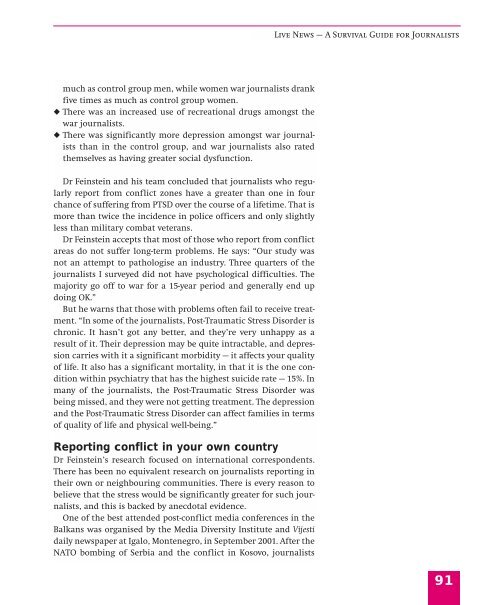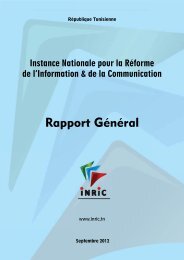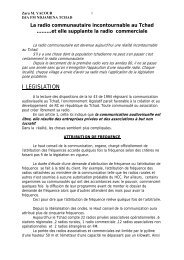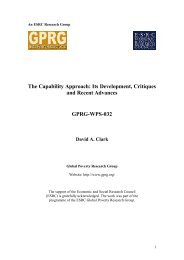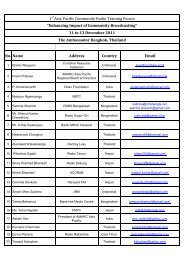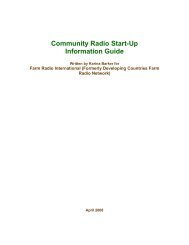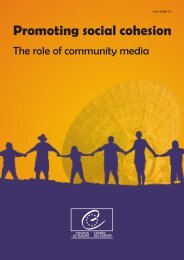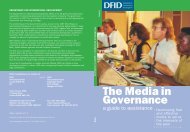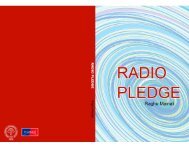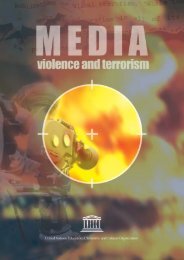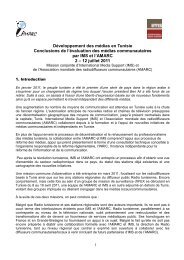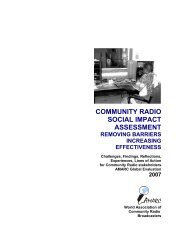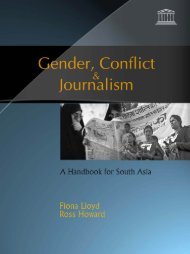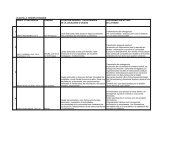CHAPTER 6Post-Traumatic Stress Disorder‘I wanted toswap placesand be the onewho was dead’"What hit me like asledgehammer was when Iwas working withsomebody who was killedand I wasn't — I didn'tknow how to handle thatat all.“I thought it was my fault,and was convincedeverybody else thought itwas my fault, and I wantedto swap places and be theone who was dead.“I’d heard <strong>of</strong> posttraumaticstress disorder,but thought it was anindulgent, ‘Nancy boy’thing. It was a terribleexperience and I becamevery moody and paranoid,socially dysfunctional andunable to work, and it wasto do with being alive. Theonly way I could get out <strong>of</strong>it was to go and get help.“It was one <strong>of</strong> my bosses– significantly a woman –who said to me: ‘You looklike shit. You’re in a state,and I‘ve made anappointment for you to goand see somebody.’” ■Allan Little, BBC reporter,Freedom Forum panel 2001reporters and crews are at greater risk. Jeremy Bowen, a BBC correspondentfor 15 years, has covered around a dozen wars and conflicts.He told the conference how one finally got past his defences.“The thing that was qualitatively different for me was inLebanon, when the Israelis were withdrawing, when a valuedfriend and colleague <strong>of</strong> mine was killed in front <strong>of</strong> my eyes by theIsraelis. He was in his car and they blew it up with a tank shell. Iwas very close by. I was stuck there on the scene for a couple <strong>of</strong>hours, unable to get out. It was appalling. It was the worst day <strong>of</strong>my life.“Afterwards my response was different to the way it had been incovering other conflicts. I had some <strong>of</strong> the classic symptoms <strong>of</strong>stress. I had bad dreams. I was hyper-vigilant. I later discoveredwhat that was. I kept thinking something would fall on my head,or I’d start at sudden noises. I knew about the BBC counselling service.I thought I’d try it out and I found it really helpful. I only hadone really long session with the guy and spoke to him on thephone as well. He said, ‘Look here, your response is normal and youshould just be a bit concerned if it continues’. I found that helpful.It wasn’t magic. But it certainly was helpful.”Research commissioned by the Freedom Forum at the University<strong>of</strong> Toronto suggests that international correspondents who reporton wars and conflicts have almost the same risk <strong>of</strong> PTSD anddepression as army combat veterans. Dr Anthony Feinstein and histeam at the University <strong>of</strong> Toronto compared 140 war journalistsworking for North American or international media with a controlgroup <strong>of</strong> 69 journalists working on other kinds <strong>of</strong> stories. Theyasked about sadness, lack <strong>of</strong> enjoyment, loss <strong>of</strong> sleep, loss <strong>of</strong> selfworthand suicidal thoughts. They also asked about the extent towhich the journalists:◆ re-experience traumatic events through dreams, flashbacks orintrusive and <strong>of</strong>ten unwelcome recollections,◆ stay away from reminders <strong>of</strong> the trauma,◆ suffer physiological arousal such as increased heart rate, sweatingand anxiety.The team found that:◆ War journalists were three times more likely than the controlgroup to suffer post-traumatic stress symptoms.◆ An astonishing 53% were either single or divorced – a very bigdifference from the control group.◆ They drank more than the control group – men drank twice as90
<strong>Live</strong> <strong>News</strong> — A <strong>Survival</strong> <strong>Guide</strong> for <strong>Journalists</strong>much as control group men, while women war journalists drankfive times as much as control group women.◆ There was an increased use <strong>of</strong> recreational drugs amongst thewar journalists.◆ There was significantly more depression amongst war journaliststhan in the control group, and war journalists also ratedthemselves as having greater social dysfunction.Dr Feinstein and his team concluded that journalists who regularlyreport from conflict zones have a greater than one in fourchance <strong>of</strong> suffering from PTSD over the course <strong>of</strong> a lifetime. That ismore than twice the incidence in police <strong>of</strong>ficers and only slightlyless than military combat veterans.Dr Feinstein accepts that most <strong>of</strong> those who report from conflictareas do not suffer long-term problems. He says: “Our study wasnot an attempt to pathologise an industry. Three quarters <strong>of</strong> thejournalists I surveyed did not have psychological difficulties. Themajority go <strong>of</strong>f to war for a 15-year period and generally end updoing OK.”But he warns that those with problems <strong>of</strong>ten fail to receive treatment.“In some <strong>of</strong> the journalists, Post-Traumatic Stress Disorder ischronic. It hasn’t got any better, and they’re very unhappy as aresult <strong>of</strong> it. Their depression may be quite intractable, and depressioncarries with it a significant morbidity — it affects your quality<strong>of</strong> life. It also has a significant mortality, in that it is the one conditionwithin psychiatry that has the highest suicide rate — 15%. Inmany <strong>of</strong> the journalists, the Post-Traumatic Stress Disorder wasbeing missed, and they were not getting treatment. The depressionand the Post-Traumatic Stress Disorder can affect families in terms<strong>of</strong> quality <strong>of</strong> life and physical well-being.”Reporting conflict in your own countryDr Feinstein’s research focused on international correspondents.There has been no equivalent research on journalists reporting intheir own or neighbouring communities. There is every reason tobelieve that the stress would be significantly greater for such journalists,and this is backed by anecdotal evidence.One <strong>of</strong> the best attended post-conflict media conferences in theBalkans was organised by the Media Diversity Institute and Vijestidaily newspaper at Igalo, Montenegro, in September 2001. After theNATO bombing <strong>of</strong> Serbia and the conflict in Kosovo, journalists91


